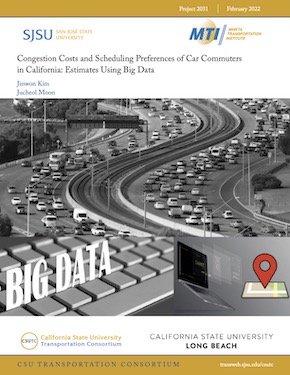- 408-924-7560
- mineta-institute@sjsu.edu
- Donate
Congestion Costs and Scheduling Preferences of Car Commuters in California: Estimates Using Big Data
On average, California car commuters waste 4–5 minutes per morning commute due to congestion. Multiplied across all California car commuters, those few minutes entail a yearly total of approximately 2.3 billion hours of time wasted, costing 6 billion dollars. The objective of this study is to quantify congestion costs and determine how commuters adapt to the level of congestion they face (i.e., commuters’ scheduling utility functions). To that end, this research developed a model of trip scheduling under congestion to construct California commuters’ travel-time profiles, i.e., the menu of travel times that each individual would likely face according to alternate trip timing choices. The results show that commuters facing higher levels of congestion tend to avoid delays by arriving at an inconvenient edge time rather than commuting during the peak. Further, commuters are willing to accept about 0.5 additional minutes of schedule delay to reduce travel time by 1 minute. We found that for most commuters in our data, the travel time profile is much flatter than the estimated schedule utility, which implies that commuters tend to arrive around their own ideal arrival times, although the estimated utility function exhibits a moderate schedule inflexibility. This finding ultimately calls into question the existing bottleneck model’s quantification of the economic cost of congestion as well as the optimal toll to ameliorate congestion.
JINWON KIM
Dr. Jinwon Kim is an associate professor in the Department of Economics at Sogang University who studies the economics of traffic congestion and urban spatial structure.
JUCHEOL MOON
Dr. Jucheol Moon is an assistant professor in the Department of Computer Engineering and Computer Sciences at California State University, Long Beach, and has a particular interest in machine learning algorithms.
-
Contact Us
San José State University One Washington Square, San Jose, CA 95192 Phone: 408-924-7560 Email: mineta-institute@sjsu.edu






